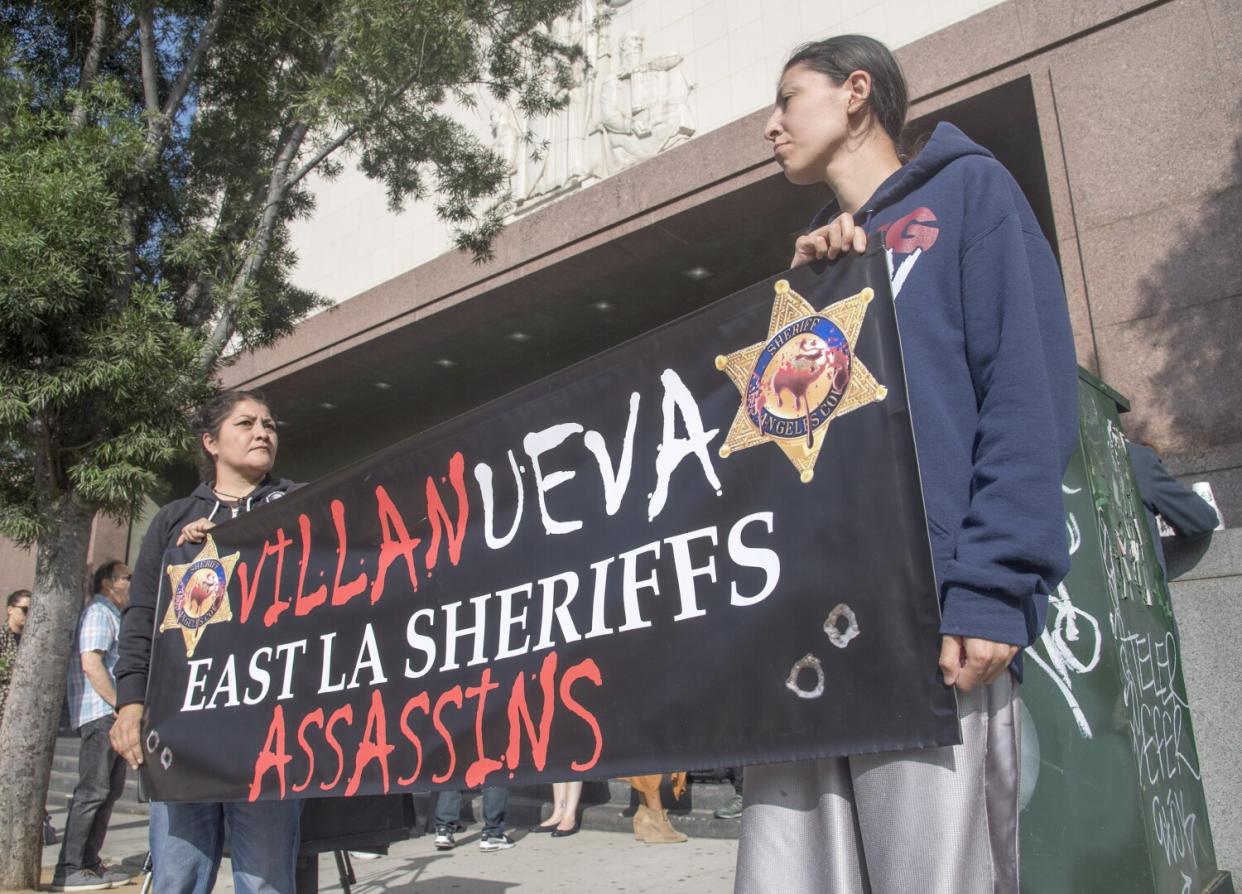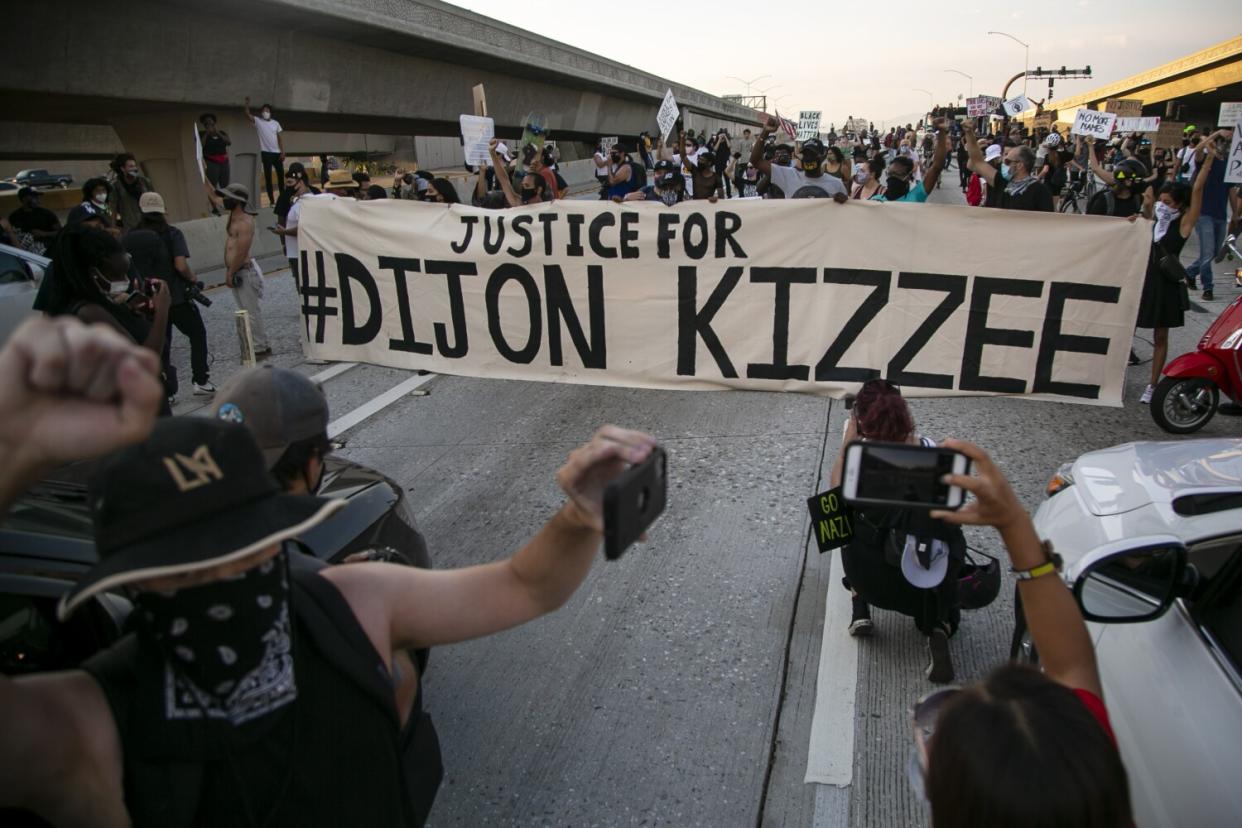L.A. County's sheriff has a strange obsession with how much media coverage Black people get

It didn't take long for Los Angeles County's controversial and frequently bombastic sheriff, Alex Villanueva, to lay his hands on a proverbial third rail.
Early on in my interview with him last week, I asked about a topic that has always perplexed me.
Although Latinos have protested police brutality against their community for decades in Southern California and beyond, the issue rarely generatesthe same level of widespread anger as similar cases that have long played out in the Black community. Not only that, there’s never been a case of a Latino killed by law enforcement that has galvanized Americans the way too many cases of slain Black people have and continue to do.
I asked Villanueva to respond to this discrepancy.
“You know, it's a good question,” he replied. “I'll say it's cultural.”

He mentioned slavery, redlining, Reconstruction, Jim Crow, the Ku Klux Klan and “so much trauma from way back when to the present time” that explained the Black community’s sustained distrust of law enforcement. Latinos, he reasoned, didn’t have that same historical experience with the American government.
It was a progressive analysis, and one that surprised me. What didn’t surprise me were the dog whistles Villanueva blew on the way to get to that conclusion.
He rattled off the names of George Floyd, Trayvon Martin, Breonna Taylor and Michael Brown, all Black people who, save for Martin, were killed by law enforcement and whose deaths sparked nationwide protests.
“For every one ‘Say her name,’” Villanueva proclaimed, “you'd have to say a thousand names of people who were killed. Black people killing Black people.”
He then named four local cases of murdered women — among them Beverly Hills philanthropist Jacqueline Avant and UCLA student Brianna Kupfer — where the accused killers are Black men.
“And is anybody be out there in the street chanting, ‘Say their name?’” he continued. “No one is going to. And how many people die? The overwhelming majority of these people are going to die by someone who looks exactly like them.”
I tried to point out that intraracial violence is also a phenomenon among Latinos — all races, for that matter.
“But not to the same degree,” Villanueva shot back. He added that Black men were vastly overrepresented in the Los Angeles County Jail, while noting “hardly anybody” incarcerated there is Asian.
“Now [Asians have] become more prevalent as victims of hate crimes," he continued. “And look at the one who's assaulting victims. Overwhelming majority are Black. It's a rule in media that it cannot be mentioned.”

What was the point of all this? I had no idea. But not only did Villanueva walk into this theme, he kept going back to it throughout our one-hour chat.
Villanueva felt Black people have it far better today than in the past — and what’s keeping young Black people down is themselves.
“The adversity, generation after generation, keeps diminishing,” he said. “You can't say today — someone today, raised as a kid in school, has the adversity that their grandparents or their great-great-grandparents. It’s been diminishing. The greatest adversity young Black kids today face is by other young Black kids. Statistically, mathematically, it's a slam dunk. Who trashes the schools? The same kids.”
Then Villanueva brought it back to our original topic.
“Today, [activists are] running around saying that [law enforcement are] slave catchers,” he said. “We don't have the same perspective in the Latino community.”
That’s when I realized Villanueva was even more Latino than I gave him credit for. He had tapped into the vein of anti-Blackness latent in all Latinos, one that gets exacerbated when Black and Latino communities compete for the same resources in the United States.
This type of resentment politics is toxic — and Villanueva offered far too many personal examples.
As a sergeant lieutenant in the 2000s, he said, superiors at the time told him "for every Black, we’ll have one Latino. But then when we were five times as many Latinos as Blacks, that math never worked out for us very well."
He remembered going to the Monterey Park headquarters of the Sheriff's Department and seeing framed photos of division chiefs, past and present, in a waiting room.
“There was only one Latino on the entire wall,” he said, in a lineup of about 40 to 50. “I counted nine Black division chiefs … And I thought to myself, ‘Nine and one.’”
He read the names of those division chiefs. “It was a massive nepotism operation … All of that ended when I made sheriff.”
Currently, there are four Black division chiefs and four Latinos.
When we talked about the deputy gangs within his department that have brought so much public scrutiny for decades but which the sheriff has fastidiously defended, Villanueva insisted he was a victim of a double standard.
“I guarantee you, if I was a Black sheriff in a majority Black organization, you would never hear the term ‘deputy gang,’” he said. “I promise you.”
When talking about the lack of Latino reporters at the Los Angeles Times, Villanueva then suggested there were too many Black writers at the expense of Latino ones, at one point even saying I should tell L.A. Times owner Dr. Patrick Soon-Shiong, “for every Black reporter, you expect to see four Latino. Give him that number. Tell him I said it.”
Noted.
“I look at the [columnists] in the L.A. Times, how many people like you are Black versus Latino?" he blurted. "It's you and Steve Lopez. That's about it?”
The Times actually has three Black columnists, compared to five Latinos. Butwhen I mentioned one of my fellow columnists, Jean Guerrero, he winced.
“Can't really tell,” he replied. I scoffed. He continued.
“I get an article every day or every other day about the Black experience and Black life in America … literally almost every day, like clockwork,” he said. “It's, like, a dozen of them? And I just compare [with Latino coverage] — it doesn't seem to equate to what the population is in L.A.”
Villanueva did think Black issues are important to cover … and then brought up two cases of Latinos who died after being assaulted, allegedly by Black suspects. “And that got no attention,” he said. “But Dijon Kizzee?”

He was referring to a Black cyclist shot 15 times and killed in 2020 by deputies who say they tried to stop Kizzee and fired only after he made a "motion" to grab a gun that had slipped out of his jacket. Protests happened for weeks afterward, and Kizzee's family filed a $35-million dollar wrongful-death lawsuit.
“How much attention did that garnish? That was a guy — gangster, convicted, with a gun … He was not there for to do his laundry, or … to work out. He was there for a purpose. And he just gets reduced to being, ‘Oh, he's just a cyclist and we're picking on cyclists.’"
I could've pressed Villanueva more on all of this, but I let him speak instead.
It was really something. I arrived at our interview expecting us to focus on the Latino experience. Then the sheriff proceeded to offer a master class in racial … insensitivity? Cluelessness?
Intolerance?
All of the above?
I'm still not sure.
This story originally appeared in Los Angeles Times.
